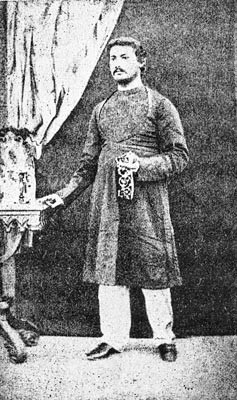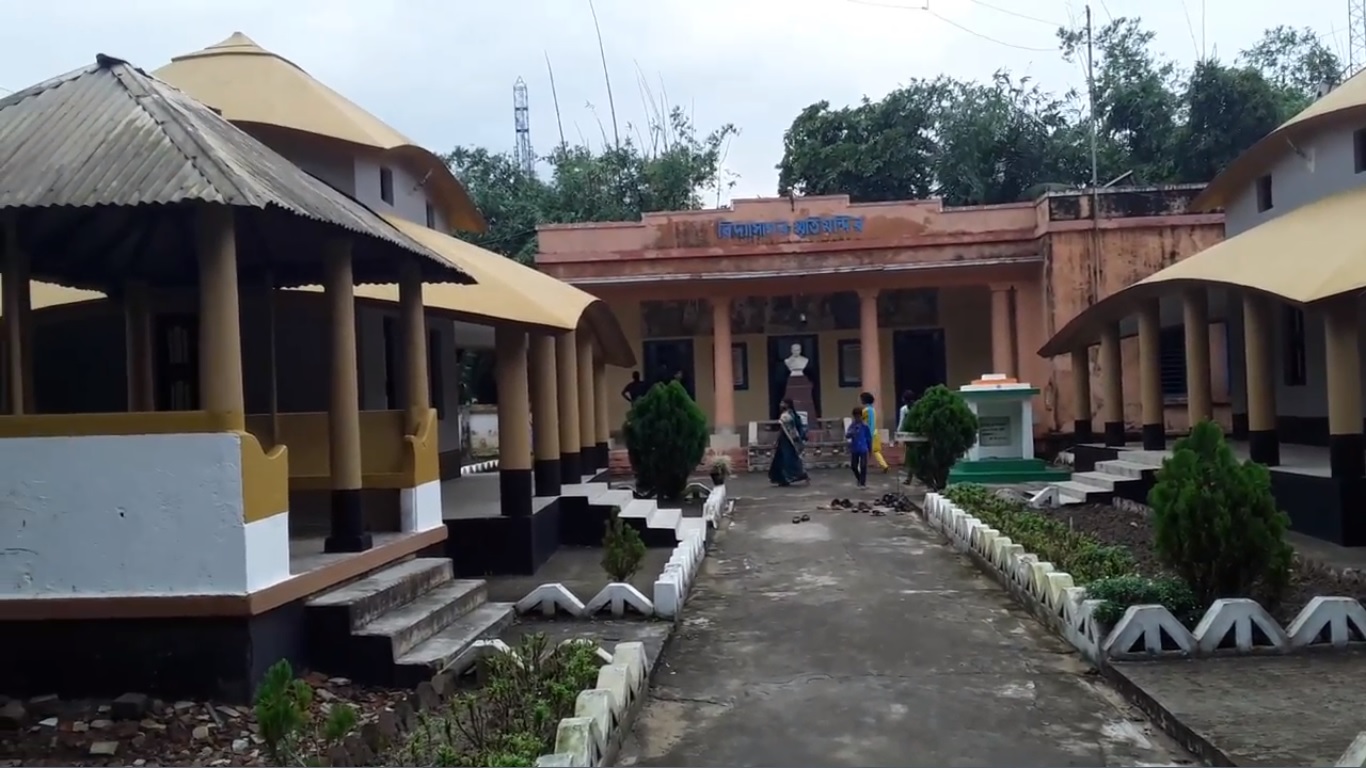|
Hemendranath Tagore
Hemendranath Tagore (1844–1884), Debendranath Tagore's third son, is notable for being the first Brahmo as the first child born in 1844 to any of the original 21 Brahmos who swore the First Brahmo Covenant on 21 December 1843 at Calcutta (now Kolkata). An intensely private person, he was also well known as the strict disciplinarian entrusted with the responsibility of looking after the education of his younger brothers in addition to being administrator for his large family estates. He was also the constant spiritual companion to his father Debendranath Tagore who founded Brahmoism and, despite his youth, he acted as the mediator between his father and the seniors of the ''Tattwabodhini Sabha''. At the time of the First Brahmo Schism of 1865, he was responsible for expelling the non-Brahmin workers from the Calcutta Brahmo Samaj. The Adi Dharm religion is founded exclusively on his philosophy and is today the largest development from Brahmoism with over 8 million adherents ... [...More Info...] [...Related Items...] OR: [Wikipedia] [Google] [Baidu] |
Debendranath Tagore
Debendranath Tagore (15 May 1817 – 19 January 1905) was an Indian Hindu philosopher and religious reformer, active in the Brahmo Samaj (earlier called Bhramho Sabha) ("Society of Brahma", also translated as ''Society of God''). He joined Brahmo samaj in 1842. He was the founder in 1848 of the Brahmo religion, which today is synonymous with Brahmoism. Born in Shilaidaha, his father was the industrialist Dwarkanath Tagore; he himself had 14 children, many of whom, including Nobel-prize winning poet Rabindranath Tagore, made significant artistic or literary contributions to society. Thakur Bari (House of Tagores) Debendranath Tagore was born to the Tagore family in Jorasanko, popularly known as Jorasanko Thakur Bari in North-western Kolkata, which was later converted into a campus of the Rabindra Bharati University. The Tagore family, with over three hundred years of history,Deb, Chitra, pp 64–65. has been one of the leading families of Calcutta, and is regarded as a key influe ... [...More Info...] [...Related Items...] OR: [Wikipedia] [Google] [Baidu] |
Ishwar Chandra Vidyasagar
Ishwar Chandra Vidyasagar CIE ( bn, ঈশ্বর চন্দ্র বিদ্যাসাগর; 26 September 1820 – 29 July 1891), born Ishwar Chandra Bandyopadhyay, was an Indian educator and social reformer of the nineteenth century. His efforts to simplify and modernise Bengali prose were significant. He also rationalised and simplified the Bengali alphabet and type, which had remained unchanged since Charles Wilkins and Panchanan Karmakar had cut the first (wooden) Bengali type in 1780. He was the most prominent campaigner for Hindu widow remarriage, petitioning the Legislative Council despite severe opposition, including a counter petition (by Radhakanta Deb and the Dharma Sabha) which had nearly four times as many signatures. Even though widow remarriage was considered a flagrant breach of Hindu customs and was staunchly opposed, Lord Dalhousie personally finalised the bill and the ''Hindu Widows' Remarriage Act'', ''1856'' was passed . Against child marriage,e ... [...More Info...] [...Related Items...] OR: [Wikipedia] [Google] [Baidu] |
1844 Births
In the Philippines, it was the only leap year with 365 days, as December 31 was skipped when 1845 began after December 30. Events January–March * January 15 – The University of Notre Dame, based in the city of the same name, receives its charter from Indiana. * February 27 – The Dominican Republic gains independence from Haiti. * February 28 – A gun on the USS ''Princeton'' explodes while the boat is on a Potomac River cruise, killing two United States Cabinet members and several others. * March 8 ** King Oscar I ascends to the throne of Sweden–Norway upon the death of his father, Charles XIV/III John. ** The Althing, the parliament of Iceland, is reopened after 45 years of closure. * March 9 – Giuseppe Verdi's opera ''Ernani'' debuts at Teatro La Fenice, Venice. * March 12 – The Columbus and Xenia Railroad, the first railroad planned to be built in Ohio, is chartered. * March 13 – The dictator Carlos Antonio López becomes first President of Pa ... [...More Info...] [...Related Items...] OR: [Wikipedia] [Google] [Baidu] |
Brahmos
The BrahMos (also designated as PJ-10)India Displays Big Missiles at Defense Show . ''Aviation International News''. 19 April 2018. is a medium-range stealth supersonic cruise missile that can be launched from submarine, ships, airplanes or land, notably being the fastest supersonic cruise missile in the world at the time of introducing. It is a joint-venture between the |
Bengali Zamindars
Bengali or Bengalee, or Bengalese may refer to: *something of, from, or related to Bengal, a large region in South Asia * Bengalis, an ethnic and linguistic group of the region * Bengali language, the language they speak ** Bengali alphabet, the writing system ** Bengali–Assamese script *** Bengali (Unicode block), a block of Bengali characters in Unicode * Bengali, Nancowry, a village in Andaman and Nicobar Islands, India * , a ship launched in 1837 and wrecked in 1951 * Bengali, member of the ThunderCats * Bengali-Fodé Koita, Guinean footballer * Bengali Keïta, Guinean centre-back * Bengali Market, ancient market in New Delhi, India * Bengali River, river in northern Bangladesh * Bengali Singh, Indian politician * Abdul Wahid Bengali, 19th-century theologian * Ali Sher Bengali, 16th-century Sufi * Athar Ali Bengali, politician and teacher * Izzatullah Bengali, 18th-century Persian language author * Mohamed Bengali, Ivorian footballer * Muhammad Salih Bengali, 18th-centur ... [...More Info...] [...Related Items...] OR: [Wikipedia] [Google] [Baidu] |
Tagore Family
The Tagore family (also spelled as ''Thakur''), with over three hundred years of history,Deb, Chitra, pp 64–65. has been one of the leading families of Calcutta, India, and is regarded as one of the key influencers during the Bengali Renaissance. The family has produced several persons who have contributed substantially in the fields of business, social and religious reformation, literature, art and music. Family history The original surname of the Tagores was Kushari. They were Pirali Brahmin ('Pirali’ historically carried a stigmatized and pejorative connotation) and originally belonged to a village named Kush in the district named Burdwan in West Bengal. The biographer of Rabindranath Tagore, Prabhat Kumar Mukhopadhyaya wrote in the first volume of his book ''Rabindrajibani O Rabindra Sahitya Prabeshika'' that "The Kusharis were the descendants of Deen Kushari, the son of Bhatta Narayana; Deen was granted a village named Kush (in Burdwan zilla) by Maharaja Kshitisura, ... [...More Info...] [...Related Items...] OR: [Wikipedia] [Google] [Baidu] |
Jitendra Prasada
Jitendra Prasada (12 November 1938 – 16 January 2001) was an Indian politician and a former vice-president of the Indian National Congress. He was also the political advisor to two prime ministers of India, Rajiv Gandhi in 1991 and P. V. Narasimha Rao in 1994. Prasad fought Congress Party's presidential election against Sonia Gandhi on 9 November 2000 but he was defeated. He died on 16 January 2001 in New Delhi following a cerebral haemorrhage. Personal life Jitendra Prasada was born to Kunwar Jyoti Prasada and Pamela Devi at Shahjahanpur on 12 November 1938. His grandmother Purnima Devi was the niece of Rabindranath Tagore and mother Pamela Devi belonged to the royal family of Kapurthala State. He was educated at Sam Higginbottom Institute of Agriculture, Technology and Sciences. Other institutes include Sherwood College, Nainital, Colvin Taluqdars College, Lucknow. He married Kanta Prasada on 27 January 1973. This couple have a son, Jitin Prasada and a daughter, Jahnavi ... [...More Info...] [...Related Items...] OR: [Wikipedia] [Google] [Baidu] |
Purnima Devi
Purnima Devi whose maiden name was Sudakshina Devi (1884–1972), was the youngest child of noted Brahmo Hemendranath Tagore, and niece of Rabindranath Tagore, thus part of the main Tagore family. She was married to Sir Jwala Prasada, Zamindar of Shahjahanpur and an Imperial Civil Service (ICS) officer. She was later awarded the Kaiser-i-Hind Medal by the British Raj Family Her only child, a son, Kunwar Jyoti Prasada, married Rajkumari Pamela Devi of Kapurthala State. Her elder grandson, Jitendra Prasada (deceased), was a Congress politician and member 5th, 7th, 8th, 13th Lok Sabha. Her younger grandson, Jayendra Prasada (deceased), was an agriculturalist and his family continues to live in the main ancestral house, Prasada Bhawan, in Shahjahanpur, Uttar Pradesh, India. Her eldest great grandson, son of Jayendra Prasada, Jayesh Prasada, was a Member of Uttar Pradesh Vidhan Parishad from the Pilibhit-Shahjahanpur constituency. Her youngest great grandson, son of Jitendra Prasada, ... [...More Info...] [...Related Items...] OR: [Wikipedia] [Google] [Baidu] |
Sanyasi
''Sannyasa'' (Sanskrit: संन्यास; IAST: ), sometimes spelled Sanyasa (सन्न्यास) or Sanyasi (for the person), is life of renunciation and the fourth stage within the Hindu system of four life stages known as '' Ashramas'', with the first three being Brahmacharya (bachelor student), Grihastha (householder) and Vanaprastha (forest dweller, retired). Sannyasa is traditionally conceptualized for men or women in late years of their life, but young brahmacharis have had the choice to skip the householder and retirement stages, renounce worldly and materialistic pursuits and dedicate their lives to spiritual pursuits. Sannyasa is a form of asceticism, is marked by renunciation of material desires and prejudices, represented by a state of disinterest and detachment from material life, and has the purpose of spending one's life in peaceful, spiritual pursuits. An individual in Sanyasa is known as a ''Sannyasi'' (male) or ''Sannyasini'' (female) in Hinduis ... [...More Info...] [...Related Items...] OR: [Wikipedia] [Google] [Baidu] |
O Mur Apunar Dex
O Mur Apunar Dekh () is the state and traditional song of Assam, India. It was written by Lakshminath Bezbarua and the tune was made by Kamala Prasad Agarwala. It was first published in 1909 in an Assamese magazine named ''Bahi'' ("flute"). It was officially adopted as the Assam's state song in 1927 at ''asom chatrô sônmilôn'' ("Assam Student Conference") held in Tezpur. The song was translated to Mising by Tabu Taid. The song The key of the song is D major and it's rhythm is waltz. The song was translated by Krishna Dulal Barua. See also * List of Indian state songs India is a country in Asia. It is a union made up of states and union territories. Some of these states and territories have adopted songs for the use at state functions and ceremonies. In other states, songs have been proposed or are in popular, ... References External linksO Mur Apunar Desh {{DEFAULTSORT:State Anthem of Assam Assamese literature Symbols of Assam Indian state songs ... [...More Info...] [...Related Items...] OR: [Wikipedia] [Google] [Baidu] |
Lakshminath Bezbaroa
' Lakshminath Bezbarua (, 14 October 1864), was an Assamese poet, novelist and playwright of modern Assamese literature. He was one of the literary stalwarts of the Jonaki Era, the age of romanticism in Assamese literature when through his essays, plays, fiction, poetry and satires, he gave a new impetus to the then stagnating Assamese literary caravan. He responded to the prevailing social environment through his satirical works to bring and sustain positive changes to the former. His literature reflected the deeper urges of the people of Assam. Confusion regarding date of birth There is confusion regarding the date of birth of Bezbaroa and also a story behind it as told by Bezbaroa himself. In the first line of the first paragraph of the first chapter of his auto-biography ''Mor Jiban Xuworon'' (মোৰ জীৱন সোঁৱৰণ), Bezbaroa confirms outright his inability to remember his exact date of birth that his parents used to tell him. But later when he grew you ... [...More Info...] [...Related Items...] OR: [Wikipedia] [Google] [Baidu] |


.jpg)



